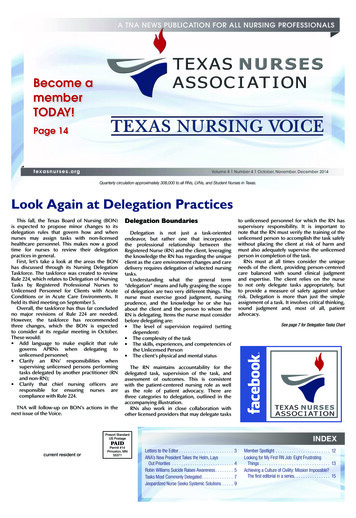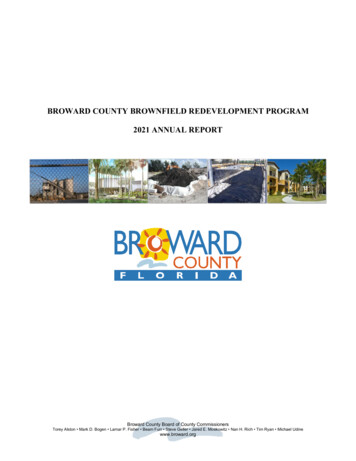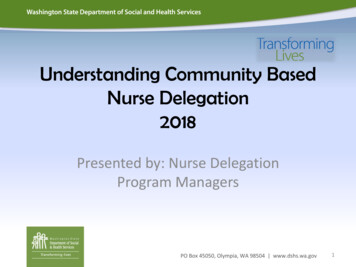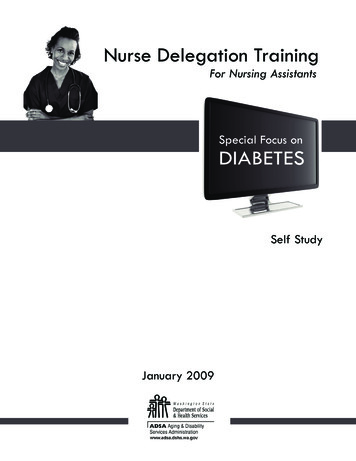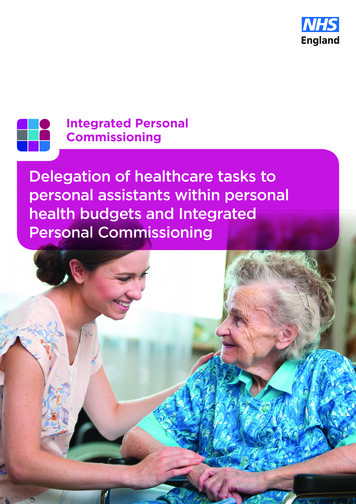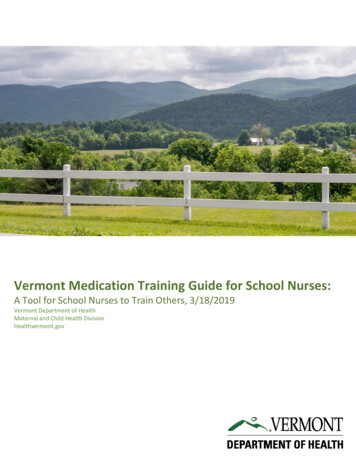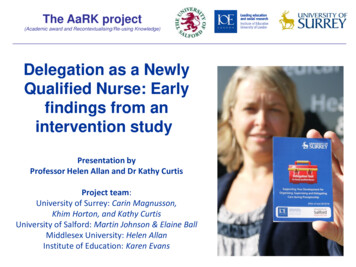
Transcription
The AaRK project(Academic award and Recontextualising/Re-using Knowledge)Delegation as a NewlyQualified Nurse: Earlyfindings from anintervention studyPresentation byProfessor Helen Allan and Dr Kathy CurtisProject team:University of Surrey: Carin Magnusson,Khim Horton, and Kathy CurtisUniversity of Salford: Martin Johnson & Elaine BallMiddlesex University: Helen AllanInstitute of Education: Karen Evans
The AaRK project(Academic award and Recontextualising/Re-using Knowledge)Background to project Recent introduction of all graduate entry tonursing in England Key workforce and economic pressures:Increased delegation of care to healthcareassistants Implications of delegation for patient safety Nursing and Midwifery Council (NMC) state thatRegistered Nurses are accountable for the caredelegated to othersDelegation “requires sophisticated clinical judgement andfinal accountability for patient care” (Weydt, 2010 )
The AaRK project(Academic award and Recontextualising/Re-using Knowledge)AimPhase one: To understandhow newly qualifiednurses (NQNs) learn todelegate and supervisecare on the wards whenworking with andsupervising healthcareassistantsPhase two: pilot of anevidence-based tool tosupport NQNs indelegationSummary of Phase One data collected(November 2011 to May 2012)Data collectionTotalmethod33 nursesObservation of66 obs.nurses(200 hours)(twice/nurse)Nurse Interviews28HealthcareAssistantsInterviews10Ward ManagerInterviewsTOTAL12116
The AaRK project(Academic award and Recontextualising/Re-using Knowledge)Why is improvedunderstandingimportant?The knowledge from thisstudy will contribute toensuring the safe andprofessional delegation ofcare; it describes thecompetencies that newlyqualified nurses need andexplores an evidencebased intervention tosupport thosecompetencies.
The AaRK project(Academic award and Recontextualising/Re-using Knowledge)Findings from Phase One: Areas where newlyqualified nurses need targeted support1. Developing Confidence2. Understanding Roleboundaries3. Accessing Knowledge4. Developing Communicationskills5. Setting Care Priorities6. Care Outcomes
The AaRK project(Academic award and Recontextualising/Re-using Knowledge)The intervention: Key requirements of a tool tosupport reflective and supportive delegationconversations Simple, useful and meaningful Focus on delegating, organisingand supervising care only Pocket-sized so that NQNs canaccess it easily – minimalpaperwork, no writing, justreflecting, talking and learning! Informed by evidence base
The AaRK project(Academic award and Recontextualising/Re-using Knowledge)The Tool: Reflective and Supportive Conversation TriggersKNOWLEDGEHow does what you have learnt aboutdelegation, including the NMC code, fitwith reality?CONFIDENCEDescribe a situation where you hadsufficient confidence in yourknowledge to organise and supervisecare given by healthcare assistants?Describe a situation where you lackedconfidence in your knowledge toorganise and supervise care given byhealthcare assistants?ROLE-BOUNDARIESDescribe how you make sure that youunderstand what the roles andresponsibilities are of members in yourteam (HCAs, student nurses, yourself).How do you set expectations inrelation to different roles andresponsibilities in the team at thebeginning of a shift?COMMUNICATIONHave there been situations wherecommunication between you andHCAs has been a challenge todelegation? Give examples?CARE PRIORITIESHow do you identify andcommunicate priorities of care inyour area to the team that youwork with?CARE OUTCOMESHow do you ensure that what youhave delegated to HCAs has beencompleted to your expectation?
The AaRK project(Academic award and Recontextualising/Re-using Knowledge)The intervention: 1 month after starting post: Asupportive discussion between‘preceptorship’ lead and NQNabout expectations of NQN statusand using the delegation tool 2nd month: second 20-30 minutediscussion using the tool 3rd month: progress discussion witha focus on learning fromexperiences and where to accessfurther support
The AaRK project(Academic award and Recontextualising/Re-using Knowledge)Early findings from NQN interviews 3 months afterintroducing the tool:45 NQN participants were recruited to phase two and interviewdata collection is still underway.Early findings: 2 NQNs have been interviewed who used the tool – dataindicates a very positive experience on several levels 11 have been interviewed who did not use the tool – dataindicates significant challenges for NQNs to access supportivediscussion to enable them to recontextualise knowledge duringpreceptorship; engage in reflection; and manage expectationson them during their transition into qualified nurse status
The AaRK project(Academic award and Recontextualising/Re-using Knowledge)NQN interviews: those who used the tool:These NQNs demonstrated: Learning through reflection: they found that it helped in theearly discussions and then they relied on it less and less ‘ithelped in the first meeting when I was worried aboutdelegation’ and later on during preceptorship it was ‘kind ofinstilled in me now’ That the cognitive skills of reflection aid therecontextualisation of knowledge: ‘its been good helping mestick to my guns when I’ve been delegating’ and ‘its beengreat in helping me build up my confidence’
The AaRK project(Academic award and Recontextualising/Re-using Knowledge)NQN interviews: those who did not use the tool:The NQNs identified: Primary focus is completing preceptorship documentation: ‘if ithad been linked to the preceptorship programme.(if) you had towrite something down because you would be discussing it, I thinkthat might have helped’ Lack of support for reflective conversations: ‘there’s been no oneto go through it with’ and ‘I’ve not had many one-to-ones’ Lack of time: ‘I just got so busy doing other things that it just wentout he window’ and ‘there’s no time to reflect on my practicebecause the ward is so busy’ and ‘no time to sit down and talk’ Defence against negative emotions?: not wanting/not supportedto reflect
The AaRK project(Academic award and Recontextualising/Re-using Knowledge)Final comments and next stages: On-going data collection and analysis, publication of findings Meaningful support within preceptorship requires furtherexploration and development as it is not meeting the needs of allNQNs (the challenges resonate with quality and provision ofclinical supervision) Poor understanding among NQNs of the value and impact ofreflection for learning and improving patient care Potential to link to defence against emotions Embedding ‘reflective triggers’ within preceptorship programmesmay increase the opportunities for NQNs to learn fromexperience and better enable recontextualisation of knowledge,such as that required for safe and effective delegation
The AaRK project(Academic award and Recontextualising/Re-using Knowledge)This presentation has not been designed as a theoretical paper butas an opportunity to share the early findings from an evidencebased intervention aimed at supporting NQNs in theirappropriate and safe use of delegation.Papers arising from the AaRK project so far. Work based learning for newly qualified nurses in the UK:Visible and invisible. People, liminal spaces and experience: understandingrecontextualisation for newly qualified nurses Newly qualified nurses and the delegation of care: a literaturestudyAny Questions?
nursing in England Key workforce and economic pressures: Increased delegation of care to healthcare assistants Implications of delegation for patient safety Nursing and Midwifery Council (NMC) state that Registered Nurses are accountable for the care delegated to others Delegation "requires sophisticated clinical judgement and

